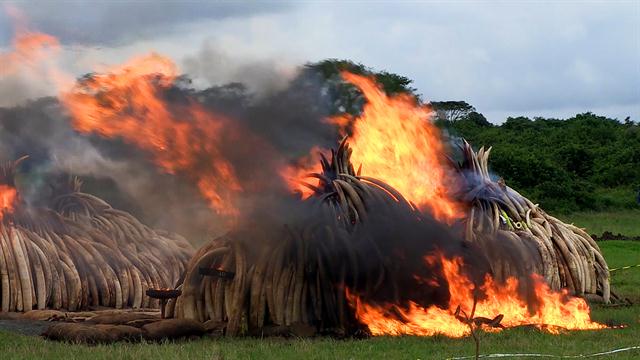China Set To Shut Down Its Ivory Trade by the End of 2017

China will be shutting down its domestic ivory trade by the end of 2017, according to an announcement made today by the Chinese government.
Advocates and many people around the world are praising China for deciding to shut down its Ivory trade by the end of 2017. China is the worlds largest consumer of ivory and with this news people are hopeful that this will save the remaining wild elephants.
“The announcement comes more than a year after China’s President Xi Jinping and United States President Barack Obama pledged to enact “nearly complete bans” on the import and export of ivory, an agreement Wildlife Watch reporter Rachael Bale described as “the most significant step yet in efforts to shut down an industry that has fueled the illegal hunting of elephants.””
“This is the best New Year’s present I’ve ever had,” says Sue Lieberman, vice president of international policy for the Wildlife Conservation Society, a nonprofit based in New York City that works to help save elephants and other wildlife. “China is the world’s largest market, both of small ivory items and high-end, expensive ones.”
What is interesting is that the global ivory trade has been banned since 1989, but during recent years large-scale poaching has resumed, and the African elephant population has dropped to as low as 415,000—a net decline of more than 110,000 from 2007. It is believed that legal domestic ivory markets perpetuate an illegal trade because it is extremely difficult to distinguish older, pre-ban ivory from poached ivory. What happens is a lot of illegal ivory makes it into legal markets because there is no way of telling really where it came from.
The U.S., also a significant market for elephant ivory, held up its end of the agreement with China in June when it enacted a near-total ban on the commercial trade of African elephant ivory. The new rules further limited exports and sales across state lines and restricted a hunter’s allowable ivory trophy imports to no more than two a year. However we would like to see it be completely banned and the imports set to zero.
China, meanwhile, has spent the past year exploring how to implement such a ban. The country convened a group of researchers from several disciplines to assess options and make recommendations to the government.
“China has 34 ivory manufacturers and 130 licensed retail shops that sell ivory, Wei Ji, an independent wildlife researcher, told the Guardian earlier this month. According to today’s announcement, China will revoke some licenses by March 2017 and eventually stop all commercial ivory carving and retail sales by the end of the year. The plan to phase out the ivory trade also encourages ivory carvers to begin using other materials.”
China’s announcement is especially significant because Beijing controls—and has actively encouraged—its domestic ivory trade.
Today’s landmark declaration follows a pledge made by the Hong Kong government last week to phase out its domestic ivory market by 2021. Hong Kong is the world’s biggest legal retail market for elephant ivory and a major transit hub for illegal ivory, much of which goes to mainland China.
Hopefully China’s set timeline for phasing out its ivory market will spur Hong Kon to shut dow its market more quickly. Japan and the European Union need to crack down on their ivory trade which still contributes to a large portion of the ivory trade.
But none the less, China pushing for a total ban is extremely exciting and gives us hope that the world is progressing. The only way to save the elephants would be to have a complete world wide ban. It is sad that some humans do not take the lives of other species as seriously as they take their own. It’s upsetting, but we are slowly making progress.

